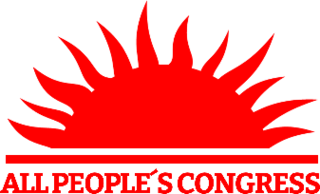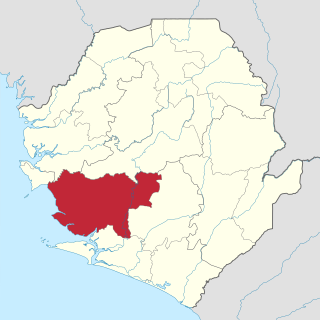Sierra Leone first became inhabited by indigenous African peoples at least 2,500 years ago. The Limba were the first tribe known to inhabit Sierra Leone. The dense tropical rainforest partially isolated the region from other West African cultures, and it became a refuge for peoples escaping violence and jihads. Sierra Leone was named by Portuguese explorer Pedro de Sintra, who mapped the region in 1462. The Freetown estuary provided a good natural harbour for ships to shelter and replenish drinking water, and gained more international attention as coastal and trans-Atlantic trade supplanted trans-Saharan trade.

Siaka Probyn Stevens was the leader of Sierra Leone from 1967 to 1985, serving as Prime Minister from 1967 to 1971 and as President from 1971 to 1985. Stevens' leadership was often characterized by patrimonial rule and self-indulgence, consolidating power by means of corruption and exploitation.

The All People's Congress (APC) is one of the two major political parties in Sierra Leone, the other being its main political rival the Sierra Leone People's Party (SLPP). The APC has been the main opposition party in Sierra Leone since 4 April 2018 when Julius Maada Bio of the SLPP won the 2018 presidential elections, though it maintains a majority in parliament.

Julius Maada Wonie Bio is a Sierra Leonean politician, and the current president of Sierra Leone since 4 April 2018. He is a retired brigadier in the Sierra Leone Army and was the military head of state of Sierra Leone from 16 January 1996 to 29 March 1996, in a military junta government known as the National Provisional Ruling Council (NPRC).

Moyamba District is a district in the Southern Province of Sierra Leone, with a population of 318,064 in the 2015 census. Its capital and largest city is Moyamba. The other major towns include Njala, Rotifunk and Shenge. The district is the largest in the Southern Province by geographical area, occupying a total area of 6,902 km2 (2,665 sq mi) and comprises fourteen chiefdoms.
The People's Movement for Democratic Change (PMDC) is a liberal party in Sierra Leone. It is a breakaway faction of the Sierra Leone People's Party (SLPP). It was officially registered on 19 January 2006. The party is led by Charles Margai, the son of Sierra Leone's second prime minister Sir Albert Margai and the nephew of Sir Milton Margai. The PMDC is based in the country's second largest city of Bo.

Charles Francis Kondo Margai is a Sierra Leonean politician and constitutional lawyer who served as Attorney General and Minister of Justice of Sierra Leone in 2018.
Solomon Ekuma Dominic Berewa was Vice-president of Sierra Leone from May 2002 to September 2007. Standing as the candidate of the Sierra Leone People's Party (SLPP), he was defeated in the second round of the 2007 presidential election by Ernest Bai Koroma of the All People's Congress (APC).
Alhaji Amadu Jalloh is a politician in Sierra Leone. He contested the 1996 presidential election as a member of the National Democratic Alliance, where he finished in 8th place with 2.3% of the first round voting. He ran again as the NDA candidate in the August 2007 presidential election, receiving 0.96% of the vote and fifth place.

Ernest Bai Koroma is a Sierra Leonean politician who served as the fourth President of Sierra Leone from 17 September 2007 to 4 April 2018.

General elections were held in Sierra Leone on 11 August 2007. Seven candidates competed in the first round of the presidential election; no candidate received the necessary 55% of the vote to win in the first round, and a second round was held between the top two candidates, Ernest Bai Koroma of the All People's Congress (APC) and Solomon Berewa of the Sierra Leone People's Party (SLPP), on 8 September. According to official results, Koroma won the election with 54.6% of the vote.
Momodu Koroma is a Sierra Leonean politician. He is a former Minister of Foreign Affairs and a member of the Sierra Leone Peoples Party (SLPP). He became foreign minister in May 2002, as part of a new cabinet appointed following President Ahmed Tejan Kabbah's re-election earlier in the month. Koroma had previously been Minister of Presidential Affairs. Koroma was born in the small town of Yonibana in the Tonkolili District, his father was from the Temne ethnic group, while his mother came from the Mende ethnic group. It is very rare in Sierra Leone to see inter-ethnic marriages between Sierra Leone's two largest ethnic group the Temne and Mende.

Paramount Chief Ella Koblo Gulama OBE, GCOR was a Sierra Leonean paramount chief and politician. In 1957, she became the first elected female Member of Parliament in Sierra Leone. She was re-elected in 1962. During the government of Milton Margai, Gulama became Sierra Leone and sub-Saharan Africa's first female Cabinet Minister.

General elections were held in Sierra Leone on 17 November 2012. The result was a sweeping victory for the ruling All People's Congress. Its leader, incumbent president Ernest Bai Koroma, won 58.7% of the vote, enough to win a second term without the need for a runoff. The APC also won 67 of the 112 elected seats in Parliament. To date, it is the APC's best showing at an election since the restoration of multiparty politics in 1991.

Dr Samura Mathew Wilson Kamara is a Sierra Leonean politician and economist. He was the All Peoples Congress (APC) Party's candidate for President of Sierra Leone in the 2018 election. He was the Minister of Foreign Affairs and International Cooperation of Sierra Leone from 2012 to 2017, Minister of Finance and Economic Development from 2009 to 2013, Governor of the Bank of Sierra Leone from 2007 to 2009, Financial Secretary in the Ministry of Finance during President Ahmad Tejan Kabbah's administration.

In April 1961, Sierra Leone became politically independent of Great Britain. It retained a parliamentary system of government and was a member of the British Commonwealth of Nations. The Sierra Leone People's Party (SLPP), led by Sir Milton Margai were victorious in the first general election under universal adult franchise in May 1962. Upon Sir Milton's death in 1964, his half-brother, Sir Albert Margai, succeeded him as Prime Minister. Sir Albert attempted to establish a one-party state had the ready cooperation of the opposition All People' Congress but met fierce resistance from some cadre within his party Sierra Leone People's Party (SLPP) and ultimately abandoned the idea.

Alhaji Usman Boie Kamara is a Sierra Leonean politician, businessman and mining engineer who has been Minister of Trade and Industry of Sierra Leone since 2013. He previously worked as director of the Sierra Leone National Diamond Mining Company (NDMC).

General elections were held in Sierra Leone on 7 March 2018 to elect the President, Parliament and local councils. Incumbent President Ernest Bai Koroma did not run for another term, as he was constitutionally ineligible, having served the maximum ten years in office.
Apha Saidu Bangura is a Sierra Leonean social media political commentator and political analyst who is currently a member of the communication unit at the Sierra Leone Ministry of Information and Communication. He regularly releases audio on WhatsApp and videos on YouTube about the latest major Sierra Leonean political news and other major incidents in Sierra Leone. Alpha Saidu is well known in the Sierra Leonean community in the United States and the Sierra Leonean community in Europe. Alpha Saidu is also well known across Sierra Leone.

The title First Lady of Sierra Leone is held by the female spouse of the president of Sierra Leone. The first lady is a representative of the people of Sierra Leone at home and abroad. The Office of the First Lady is an extension of State House and is responsible for social events and ceremonies at State Lodge. The First Lady’s Office is not established by an act of parliament and cannot receive government funding.













